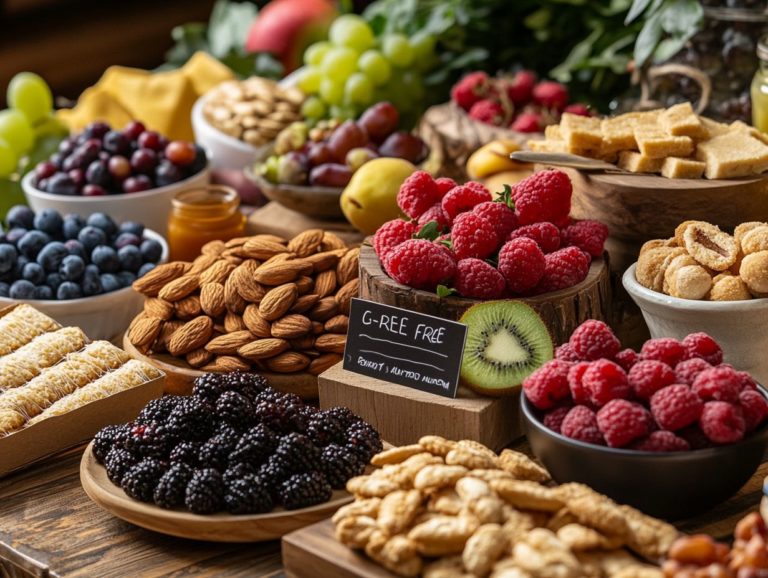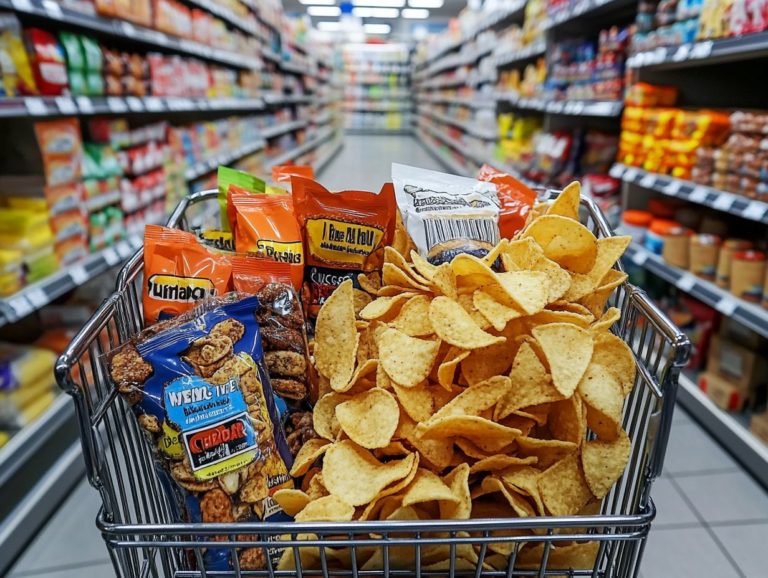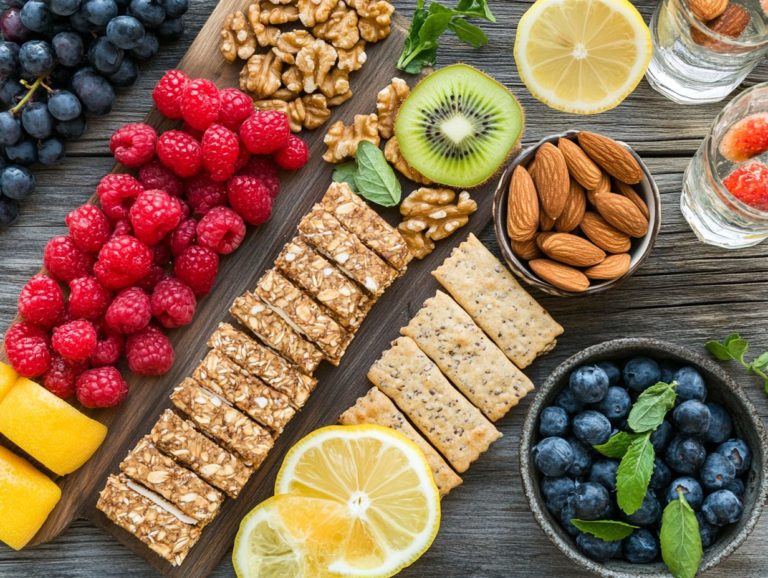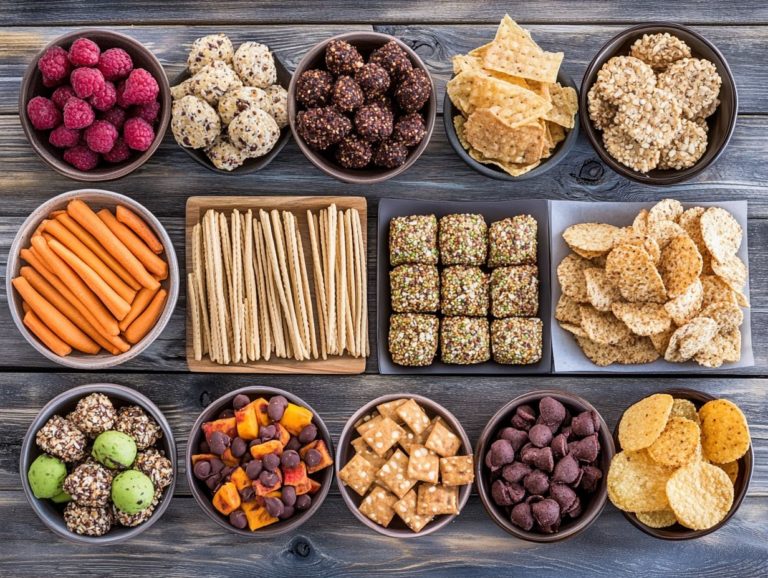What Are the Top 10 Gluten-Free Snack Myths?
Gluten-free diets have surged in popularity, but this trend has also brought forth a host of misconceptions. You may find that many still hold the belief that gluten-free snacks are unhealthy, lack flavor, or are exclusively for those with allergies or sensitivities.
This article sets the record straight by debunking the top 10 myths surrounding gluten-free snacks and uncovering the truth about their nutritional value and taste. It also presents a selection of delicious and healthy gluten-free snack options that anyone can savor, regardless of dietary restrictions.
Ready to uncover the truth about gluten-free snacks? Let’s dive in!
Contents
- Key Takeaways:
- What is Gluten-Free?
- What are the Top 10 Gluten-Free Snack Myths?
- Myth #1: All Gluten-Free Snacks are Healthy
- Myth #2: Gluten-Free Snacks are Tasteless
- Myth #3: Gluten-Free Snacks are Only for People with Celiac Disease
- Myth #4: Gluten-Free Snacks are More Expensive
- Myth #5: Gluten-Free Snacks are Hard to Find
- Myth #6: Gluten-Free Snacks are Not as Nutritious
- Common Myths about Gluten-Free Snacks
- What are Some Healthy and Delicious Gluten-Free Snack Options?
- 1. Fresh Fruits and Vegetables
- 2. Nuts and Seeds
- 3. Gluten-Free Crackers and Chips
- 4. Yogurt and Granola
- 5. Popcorn
- Frequently Asked Questions
- What are the top 10 gluten-free snack myths?
- Are all gluten-free snacks healthy?
- Do all gluten-free snacks taste bland and boring?
- Is it necessary for everyone to eat gluten-free snacks?
- Is it true that all gluten-free snacks are expensive due to marketing strategy?
- Are all gluten-free snacks labeled as gluten-free to help those with dietary restrictions?
Key Takeaways:
- Myth: All gluten-free snacks are healthy. Truth: While some may be healthier, not all gluten-free snacks are created equal.
- Myth: Gluten-free snacks are tasteless. Truth: There are plenty of delicious gluten-free options available, from fresh fruits to yogurt and granola.
- Myth: Gluten-free snacks are only for people with celiac disease. Truth: Anyone can enjoy gluten-free snacks, regardless of dietary restrictions or sensitivities.
What is Gluten-Free?
Grasping the true meaning of gluten-free is crucial for anyone navigating dietary restrictions, particularly if you ve been diagnosed with celiac disease or gluten sensitivity.
Gluten, a protein present in wheat, rye, and barley, can cause serious health complications for individuals with these conditions, prompting many to embrace a gluten-free lifestyle.
This dietary trend has surged in popularity across the United States. It has been fueled by a mix of misunderstandings about gluten and its potential effects on health.
What are the Top 10 Gluten-Free Snack Myths?
Understanding gluten-free snacks can be quite a challenge, especially with the myriad of misconceptions and myths that cloud the conversation. Many people assume all gluten-free snacks are automatically healthy, while others are convinced these treats are bland or difficult to locate.
Grasping the truth behind these myths is essential for you to make informed food choices that align seamlessly with your dietary restrictions and health aspirations.
Myth #1: All Gluten-Free Snacks are Healthy
One prevalent myth you might encounter is the belief that all gluten-free snacks are healthy. The reality is that many gluten-free products can still be heavily processed and packed with added sugars or unhealthy fats, which isn t exactly what you d consider nutritious.
This misconception can lead to confusion, especially when gluten-free options are marketed as automatically better choices. While snacks like certain bars, chips, or cookies can provide alternatives for those with gluten sensitivities or celiac disease, they often fall short in delivering the essential nutrients found in whole grains.
It’s crucial for you to scrutinize labels closely, as many gluten-free processed foods may be loaded with added sugars or unhealthy fats to improve flavor and texture. As a health-conscious individual, it s wise to consider how these snacks fit into your overall nutritional intake.
Strive for balance by incorporating whole foods such as fruits, vegetables, and lean proteins into your diet to ensure you re meeting your nutritional needs.
Myth #2: Gluten-Free Snacks are Tasteless
Another common myth is that gluten-free snacks lack flavor, but the truth is that many innovative gluten-free products are overflowing with taste and creativity.
Brands like Enjoy Life and Baked in Color are at the forefront of this movement, demonstrating that gluten-free doesn t have to mean taste-free. They prioritize high-quality ingredients that cater not only to those with dietary restrictions but also enchant the taste buds of all snack enthusiasts.
Consider the delectable chocolate chip cookies from Enjoy Life or the vibrant, veggie-infused crackers from Baked in Color; both are perfect examples of how gluten-free can be indulgent and satisfying.
Strategic marketing has skillfully created a perception that gluten-free products are healthy simply because they are gluten-free. This savvy approach has led to an increase in demand and an exciting variety in the marketplace.
Don t miss out on trying these scrumptious gluten-free options today!
Start enjoying flavorful, healthy gluten-free snacks today!
Myth #3: Gluten-Free Snacks are Only for People with Celiac Disease
Think gluten-free snacks are just for those with celiac disease? Think again! Here s the real scoop.
While gluten-free snacks are essential for individuals with celiac disease, it s important to recognize that many people without this autoimmune condition also gain advantages from gluten-free products due to gluten sensitivity or gluten intolerance.
As awareness increases, a diverse consumer base is eagerly searching for gluten-free options for various reasons. These include gluten sensitivity, digestive health, and overall well-being.
For people who have gluten sensitivity, consuming gluten can result in discomfort and other health issues, which makes gluten-free snacks a practical and appealing alternative.
By catering to this broader audience, brands have the opportunity to create delicious and nutritious gluten-free snacks that resonate with everyone, not just those diagnosed with celiac disease. Ultimately, this shift towards gluten-free products can promote healthier eating habits and ensure that individuals with dietary restrictions discover tasty options tailored to their needs.
Myth #4: Gluten-Free Snacks are More Expensive
The belief that gluten-free snacks are much more expensive has been called into question as market competition heats up and more brands venture into the gluten-free arena.
Recent consumer research reveals that while gluten-free options were once priced substantially higher, the disparity is shrinking thanks to an increasing number of manufacturers entering the market.
When you examine pricing trends, you may be surprised to find that the cost of gluten-containing snacks and their gluten-free counterparts can be quite similar, especially in bulk or when opting for store-brand selections.
If you’re looking to save, consider seeking out local co-ops, taking advantage of promotions, or exploring online platforms dedicated to gluten-free products to uncover more budget-friendly choices.
By meal prepping and purchasing in larger quantities, you can maximize your savings while still meeting your dietary needs.
Myth #5: Gluten-Free Snacks are Hard to Find
Many consumers might think that gluten-free snacks are a rare find, but the truth is that they re becoming increasingly accessible in mainstream grocery stores and online marketplaces.
This surge in availability directly responds to the rising demand for gluten-free options, prompting retailers to expand their selections to include a diverse array of snacks, from chips and cookies to protein bars.
You can now indulge in a wider range of flavors and textures, making it easier to satisfy your cravings without compromising your dietary needs.
When searching for gluten-free products, it s wise to explore the dedicated gluten-free aisles in stores and utilize online platforms that cater specifically to gluten-free shoppers.
Don t forget to read the labels and look for certified gluten-free symbols; they ll help ensure your food choices align perfectly with your dietary goals.
Myth #6: Gluten-Free Snacks are Not as Nutritious
One prevalent myth is that gluten-free snacks are devoid of nutritional value, but the reality is quite the opposite. Many gluten-free options are actually rich in fiber and essential vitamins.
These snacks are crafted from wholesome ingredients such as nuts, seeds, and whole grains, which not only satisfy your cravings but also contribute positively to your overall well-being.
If you’re living a gluten-free lifestyle, it’s vital to recognize the potential missing out on important nutrients that can arise from cutting out many traditional foods.
By selecting snacks that incorporate a diverse array of fruits and vegetables, you can significantly boost your vitamin intake.
Choosing snacks fortified with essential nutrients like iron and calcium helps maintain nutritional balance and leads to a more balanced diet, promoting improved health.
Common Myths about Gluten-Free Snacks
Myth #7: Gluten-Free Snacks do not Contain Whole Grains
Contrary to popular belief, many gluten-free snacks can actually be packed with whole grains. These snacks offer essential nutrients and fiber that you might not expect.
Consider options like quinoa, brown rice, and buckwheat. These grains not only bring a delightful variety of textures and flavors to your plate, but they also serve as fantastic sources of plant-based protein and essential minerals. By incorporating these gluten-free whole grains into your diet, you can achieve a well-rounded nutrient intake while promoting healthy digestion.
Fiber plays a vital role in maintaining gut health. It can significantly contribute to the prevention of chronic diseases. By choosing snacks made from these wholesome ingredients, you can indulge in tasty treats that support your overall wellness, proving that gluten-free doesn t have to mean nutrient-deficient.
Myth #8: Gluten-Free Snacks are Only for People with Gluten Sensitivity
Many people wrongly believe gluten-free snacks are only for those with gluten sensitivity. In reality, they can seamlessly fit into your balanced diet, especially if you’re looking to explore diverse dietary options or enhance your overall health. This applies even to those with celiac disease, an autoimmune disease triggered by gluten, or non-celiac gluten sensitivity.
More people are learning to read food labels and ingredient lists, which has sparked a surge in the popularity of gluten-free products. This growing health trend attracts those eager to minimize processed foods or curious about how various diets might impact their energy levels, weight loss, and digestion.
Personal preferences significantly influence dietary choices. Many find that gluten-free snacks resonate better with their lifestyle. These snacks provide delicious alternatives that satisfy the palate while accommodating a range of dietary needs, including specific dietary restrictions and nutritional needs.
Myth #9: Gluten-Free Snacks are not Filling
Some may think gluten-free snacks lack substance, but the reality is that many options are packed with protein and fiber, making them truly satisfying choices. In fact, snacks enriched with these nutrients can curb hunger and manage carbs more effectively than their traditional counterparts.
Take, for example, a nut-based energy bar; it combines both protein and fiber, offering a hearty treat that keeps you feeling full for a longer time. Likewise, snacks made from chickpeas or lentils provide a gluten-free solution while delivering a substantial amount of protein and fiber, making them perfect for anyone in need of a nutritious boost to avoid nutrient deficiencies often associated with restrictive diets.
By thoughtfully selecting gluten-free snacks, you can make informed choices that align with your health goals while indulging in delicious and satisfying options.
Myth #10: Gluten-Free Snacks are Bland and Boring
The idea that gluten-free snacks are nothing but bland and boring completely misses the treasure trove of flavors and inventive products available today.
In reality, gluten-free options now embrace bold tastes and captivating textures tailored to various palates. Picture crunchy kale chips infused with zesty lime and spicy chili, or savory chickpea puffs bursting with the rich flavors of rosemary and garlic these snacks are not just unconventional they’re flavor-packed delights that will excite your taste buds!
Creative artisans are playing with unexpected ingredients like seaweed and quinoa, turning them into mouthwatering crisps that not only offer health benefits but also tantalize your senses. Innovative brands have rolled out gluten-free energy bars packed with exotic ingredients like ai berries and coconut, ensuring there’s always something thrilling to satisfy your cravings without compromising on enjoyment. These products cater to the growing consumer demand for gluten-free options, driven by marketing strategy and consumer research.
Explore the diverse range of gluten-free snacks available and discover delicious options that suit your lifestyle!
What are Some Healthy and Delicious Gluten-Free Snack Options?
Get ready to explore some amazing gluten-free snacks that are not just healthy but also bursting with flavor! Exploring healthy and delicious gluten-free snack options is essential for you if you’re in search of flavorful choices that cater to your dietary needs, particularly if you are managing gluten intolerance, a wheat allergy, or other digestive issues.
Imagine indulging in fresh fruits and vibrant vegetables, or savoring delightful alternatives like gluten-free crackers and chips. There’s a diverse array of snacks available that promise to be both satisfying and nutritious, ensuring you never have to compromise on taste while maintaining your health.
1. Fresh Fruits and Vegetables
Fresh fruits and vegetables serve as exceptional gluten-free snack options that are brimming with essential vitamins, minerals, and fiber. They are a truly health-conscious choice for your snacking needs, especially for those diagnosed with gluten sensitivity or celiac disease.
These vibrant snacks cater not only to those with gluten sensitivity or celiac disease but also offer a wealth of health benefits that contribute to your overall well-being. With an array of options from crunchy bell peppers and crisp cucumbers to luscious berries and zesty citrus fruits the variety is both abundant and enticing.
You can elevate your snacking experience through engaging culinary activities. Consider crafting a colorful vegetable platter paired with hummus or guacamole for a delightful dip. Alternatively, toss together a refreshing salad featuring leafy greens, cherry tomatoes, and slices of fruit, all lightly drizzled with vinaigrette.
These nutrient-rich snacks can help alleviate symptoms of gluten sensitivity and support overall digestive health. These creative combinations satisfy your cravings and help you meet your daily nutritional needs.
2. Nuts and Seeds
Nuts and seeds present an exceptional gluten-free snack option, serving as an abundant source of healthy fats, protein, and fiber. They are ideal for managing dietary restrictions and ensuring balanced nutrient intake.
These small yet mighty powerhouses come in various forms, each brimming with its unique blend of important vitamins and minerals. For example, almonds are a fantastic source of vitamin E and magnesium, while walnuts are celebrated for their omega-3 fatty acids, which are beneficial for heart health. Pumpkin seeds are packed with zinc and antioxidants that promote a robust immune system.
To seamlessly incorporate these nutritious bites into your daily routine, consider adding them to your yogurt, blending them into your smoothies, or simply enjoying a handful as an energizing snack.
From enhancing the flavor of salads to providing a satisfying crunch in your baked goods, these versatile foods can effortlessly elevate a well-rounded diet and help ensure you get enough nutrients.
3. Gluten-Free Crackers and Chips
Gluten-free crackers and chips have truly transformed the snack landscape, offering an impressive array of options that satisfy your crunchy cravings while honoring your dietary needs.
You ll discover brands like Mary’s Gone Crackers, which masterfully combines wholesome ingredients to deliver a nutty flavor that s hard to resist. Alongside this, the classic crunch of Sch r s gluten-free selections ensures there s something to delight every palate.
These snacks not only taste incredible, but you won’t believe how amazing they are! They cater to your diverse preferences, whether you re in the mood for a cheddar-infused chip or a subtly flavored seed cracker.
Elevate your snack time by pairing these delightful treats with creamy dips, tangy hummus, or a selection of gourmet cheeses. With the right combinations, each bite can become a satisfying taste experience, making gluten-free living not just enjoyable but truly accessible.
4. Yogurt and Granola
Yogurt topped with gluten-free granola serves as a nutritious and delicious snack option, effortlessly combining protein and fiber to provide you with lasting energy. This snack is also suitable for individuals looking to manage their carbohydrate intake and maintain a balanced diet.
This pairing satisfies your hunger and offers many health benefits that can enhance your overall well-being. The creamy yogurt is packed with probiotics, supporting gut health and boosting your immune system. Meanwhile, the gluten-free granola contributes whole grains that deliver essential vitamins and minerals.
Personalization is essential; incorporating a variety of fresh fruits and a handful of nuts can elevate both the flavor and nutritional profile of your snack. For example, adding berries infuses antioxidants, while almonds or walnuts introduce healthy fats, transforming this snack into a powerhouse of flavors and health advantages. These combinations also help alleviate some of the digestive symptoms associated with gluten intolerance.
5. Popcorn
Popcorn is a fun and versatile gluten-free snack that everyone loves! You can season it in countless ways to elevate its flavor while keeping it healthy. Its impressive fiber content positions it as an exceptional option for anyone eager to incorporate more whole grains into their diet, aiding digestion and fostering a satisfying sense of fullness. This can be particularly beneficial for those following a gluten-free diet to avoid gluten proteins found in wheat, rye, barley, and triticale.
Beyond the standard butter and salt, you can delve into an array of exciting seasoning combinations to tantalize your taste buds. Consider trying:
- Nutritional yeast for a deliciously cheesy flavor
- A sprinkle of cinnamon and coconut sugar for a delightful hint of sweetness
- A zesty mixture of paprika and cayenne pepper if you’re in the mood for a spicy kick
This delightful snack not only appeals to a variety of taste preferences but also stands as a satisfying alternative to processed snacks, making it an ideal choice for movie nights or casual gatherings.
Frequently Asked Questions
What are the top 10 gluten-free snack myths?
The top 10 gluten-free snack myths are the misconceptions and false beliefs surrounding gluten-free snacks. These myths include the idea that gluten-free snacks are always healthy or that they are only necessary for those with a diagnosed gluten intolerance or celiac disease.
Are all gluten-free snacks healthy?
No, not all gluten-free snacks are healthy. While they may not contain gluten, they may still be high in calories, sugar, and unhealthy fats. It is important to read the nutrition label and ingredients list to determine the healthiness of a gluten-free snack. Consulting with dietitians or nutritionists can provide guidance on making better food choices.
Do all gluten-free snacks taste bland and boring?
No, gluten-free snacks can be just as delicious as their gluten-containing counterparts. With the rise of gluten-free diets, there are now many options available that are both tasty and gluten-free. Studies and consumer research have shown that the variety and quality of gluten-free products have significantly improved.
Is it necessary for everyone to eat gluten-free snacks?
Not everyone needs to eat gluten-free snacks. While a gluten-free diet is essential for those with celiac disease or non-celiac gluten sensitivity, others may choose it for perceived health benefits or due to dietary trends. It is important to base such decisions on accurate information and personal health needs. Only those with celiac disease or gluten sensitivity need to avoid gluten in their diet due to symptoms like digestive issues.
Is it true that all gluten-free snacks are expensive due to marketing strategy?
No, not all gluten-free snacks are expensive. While some specialty gluten-free products may be more costly, there are also many affordable options available, such as fruits, vegetables, nuts, seeds, and other whole grains. Consumer research shows that budgeting for a gluten-free diet does not have to be difficult.
Are all gluten-free snacks labeled as gluten-free to help those with dietary restrictions?
Understanding Gluten-Free Labels
Are you looking for gluten-free snacks? Not all snacks labeled gluten-free are created equal!
No, not all gluten-free snacks have proper labels. Some grain products may be naturally gluten-free but lack a clear gluten-free label.
Others might still have gluten from wheat, rye, barley, or triticale. This can lead to nutritional problems if not monitored closely.
Always check the ingredients list. If you are unsure, contact the manufacturer.






